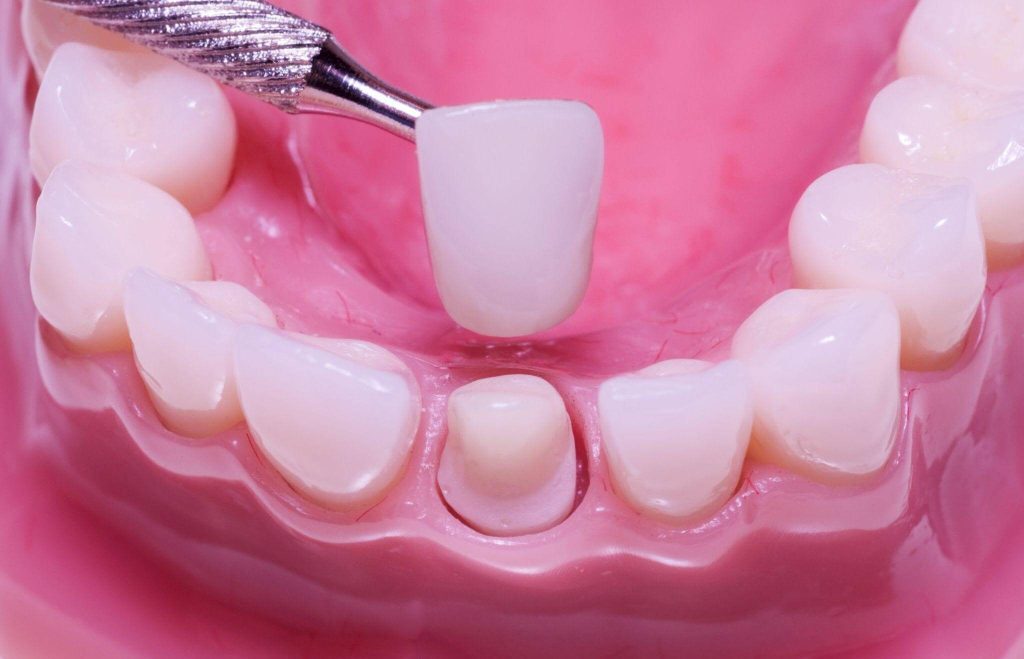Our teeth bear the wear and tear of daily life, constantly chewing, biting, and helping us enjoy our favourite meals. However, life can throw unexpected challenges at our pearly whites. Whether due to a crack, chip, or a deep cavity, our teeth sometimes need a bit of extra help to stay strong and healthy. It’s during these moments that dental crowns come to the rescue, providing the support and protection our teeth require to maintain their optimal functionality and aesthetics. But what exactly are dental crowns, and why might you need them? Find out in the blog.
What are Dental Crowns?
Dental crowns are custom-made coverings that encase a damaged or weakened tooth. They are tailored to fit over your existing tooth structure, providing strength, support, and improved aesthetics. Dental crowns can be made from various materials, including metal, a combination of porcelain and metal, glass ionomer, all-porcelain, and zirconia. The choice of material depends on factors such as the location of the tooth, aesthetic considerations, and functional requirements. Your dentist will work with you to determine the most suitable material based on your individual needs and preferences.
When Do You Need a Dental Crown?
A dental crown is mostly recommended when a tooth undergoes structural damage, decay, or extensive wear. These conditions can weaken a tooth, compromising its strength and functionality. In response to issues such as large cavities, fractures, or the aftermath of a root canal treatment, a dental crown is employed to provide protection and reinforcement to the treated tooth. Beyond functional restoration, crowns also play an essential role in cosmetic dentistry, ensuring that the replaced or restored tooth closely resembles the natural shape, size, and colour of the original tooth. This dual functionality of addressing both structural concerns and aesthetic considerations makes dental crowns a versatile solution for various dental issues.
Reasons: Why Do You Need a Dental Crown?
When your dental health is compromised by factors such as damage, decay, or structural weaknesses, your dentist may recommend a dental crown. This custom-made dental prosthetic not only restores the tooth’s strength and functionality but also addresses aesthetic concerns by mimicking the natural appearance of the original tooth.
Some common reasons why you may need a dental crown include:
Damage or Decay
When a tooth undergoes significant damage from trauma, fractures, or decay, it can compromise its structural integrity. In such cases, a dental crown serves as a protective shield that encases the damaged tooth, providing a robust covering to prevent further deterioration. This not only restores the tooth’s strength but also ensures lasting protection against potential harm, allowing you to maintain a healthy and functional smile.
Root Canal
A root canal is a dental treatment in which the infected or damaged pulp (the innermost part of the tooth containing nerves and blood vessels) is removed. Due to the removal of its living tissue, the tooth becomes hollow, making it structurally weaker. Therefore, following a root canal procedure, it is often recommended to place a dental crown to reinforce the treated tooth, protecting it from potential damage and restoring both its strength and appearance.
Dental Implants
During a dental implant procedure, a titanium post is securely implanted into the jawbone, serving as an artificial root to support a replacement tooth. Following the healing period, an abutment is attached to the implant, creating a stable foundation for the replacement tooth. A custom-designed dental crown is then placed onto the abutment, completing the implant restoration. This comprehensive process results in a natural-looking and fully functional smile for enhanced oral health and aesthetic satisfaction.
Partial Dentures or Bridges
In the context of partial dentures or bridges, a dental crown serves as an essential anchor, providing stability and support to the dental appliance. Placed on the adjacent natural teeth, these crowns secure the partial denture or bridge in position, preventing movement and ensuring a snug fit. Beyond structural reinforcement, the crowns contribute to the overall functionality of the dental restoration, allowing individuals with missing teeth to enjoy improved chewing abilities and maintain a beautiful and functional smile.
Cover Large Fillings
Teeth with large fillings relative to their size can become vulnerable to fractures. A dental crown is recommended in such cases to cover and support the tooth, preventing potential damage and providing additional support. It helps distribute biting forces more evenly, reducing the risk of cracks or breakage. By covering large fillings with crowns, dentists enhance the structural integrity of the tooth, preventing further deterioration and ensuring long-term stability for improved oral health.
Dental Crown Procedure & Steps
The dental crown procedure at Heathcote Dental Surgery involves several essential steps tailored to your individual needs:
- Following an initial consultation and material selection, the affected tooth is prepared by removing a small portion of its outer structure to create space for the crown.
- Digital impressions of the prepared tooth are then taken, either using in-house CEREC technology for same-day restorations or by sending impressions to a dental laboratory for more complex cases.
- A temporary restoration may be placed to safeguard the prepared tooth until your final restoration is ready.
- Once ready, you return for your final crown placement, where the dentist ensures a precise fit and assesses the aesthetics and functionality before permanently bonding the restoration.
- Comprehensive aftercare instructions are provided, accompanied by regular follow-up appointments to monitor the health and longevity of your newly placed crown.
Are Dental Crowns Worth It?
Dental crowns offer a range of benefits, including safeguarding weakened or broken teeth, restoring functionality, and improving the cosmetic appearance of your smile. When properly cared for, these crowns can endure for many years, providing long-lasting support and protection to the underlying tooth structure. Nevertheless, there is a potential risk of crown breakage or detachment. This could be attributed to issues such as insufficient cement adhesion or underlying tooth decay. Therefore, it is vital to stay vigilant about regular dental checkups and maintenance to address any potential concerns promptly. Early detection and intervention can help prevent complications and ensure the prolonged success of your dental crown.
Revitalise Your Smile with Dental Crowns at Heathcote Dental Surgery
At Heathcote Dental Surgery, we believe in creating a tailored dental experience, ensuring that the recommendation for a dental crown is not just a one-size-fits-all solution but a crafted enhancement to your individual radiance. With our commitment to patient convenience, we also offer CEREC crowns, enabling same-day restorations crafted in-house that eliminate the inconvenience of multiple visits to the dentist. If you’re struggling with compromised oral health and wish to explore your eligibility for dental crowns, we invite you to book a consultation with us.


